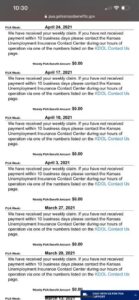Many unemployed Kansans have had to wait months for unemployment benefit checks due to what media would call bureaucratic incompetency if a Republican was governor, the Kelly administration now tells them to go to sheriff departments to verify their identity. The Kansas Department of Labor continues to struggle with a horribly outdated employment computer system and record levels of fraud, the state is instead utilizing law enforcement to verify the identity of fraud victims.
KAKE TV reports that a new partnership between the Department of Labor and law enforcement agencies requires unemployed fraud victims to take additional action.
In short, people who have not seen an unemployment check in months because of a hold on their accounts are now expected to take ID to the county jail records office, where their identity will be verified and forwarded to KDOL.
‘Largely stabilized’ disputed by the unemployed
 According to an April 6 press release, Kelly’s administration said the state UI system has “largely been stabilized,” but comments on multiple Facebook groups indicate people are still reporting having gone months without payment.
According to an April 6 press release, Kelly’s administration said the state UI system has “largely been stabilized,” but comments on multiple Facebook groups indicate people are still reporting having gone months without payment.
“I have not been paid since Dec 2020, except for 2 random weeks in February. March 1st, I was flagged for fraud,” one commenter wrote, adding she has made multiple calls and has been told she’s “verified” but has not received payment. I’ve sent in everything that KDOL has asked for and requested, months ago, and still not a dime. “It’s been 6 months, I’ve lost my car, my sanity, and hope.”
Filers are also receiving notices that state KDOL has received their weekly claim, and if they’re not paid within 10 business days to contact KDOL — but many of them date back more than a month without payment.
Upgrades are still a year away
Kelly was warned more than a year ago to expect massive fraud, but the plans for upgrades are not even expected to be completed until the fall of this year, and the project is not slated to start until late fall or the winter of this year.
Moreover, the Kelly administration claims the modernization plan stalled “due to COVID,” and blames the federal government and Republicans for not upgrading the state’s 44-year-old computer system, disregarding the fact that Democrat governors Kathleen Sebelius, Mark Parkinson, Joan Finney, and others would be equally to blame.
“No amount of blame-shifting can change the fact that Governor Kelly is ultimately the one responsible for fraud occurring under her watch,” Kansas House Majority Leader Dan Hawkins said through a spokesperson in March. “Governor Kelly was entrusted with taxpayer money to help those truly in need, and she broke that trust.
Additionally, in February the Sentinel reported that an “accidental hack” had exposed a serious security flaw in the system, and in March found that as much as half of all Kansas claims were fraudulent. And an audit found that the state had paid out nearly $600 million in fraudulent claims.
Fraud total remains a closely-held secret
While expecting law enforcement to do the administration’s job, the Kelly administration is also failing to disclose just how much fraud there has been — indeed, it would appear the state simply doesn’t know.
“The department has struggled to find out just how many fraudulent claims have been paid out,” the Kansas City Star reported in January. “But here are two possible signs that the fraud may be scandalously large: Initial filings for jobless benefits were thought to have surged by more than 76,000 the week of Jan. 16 — tens of thousands above those at the start of the year.”
The Sentinel, too, has been attempting to determine just how many fraudulent claims have been paid.
In late November, of last year, the Sentinel sent a Kansas Open Records Request asking for “Total number of unemployment claims for the dates July 1, 2020, through Nov. 19, 2020. The total number of attempted fraudulent claims for the same dates. Tthe total number of fraudulent claims paid out for the same dates. The total dollar figure of fraudulent unemployment claims paid out. Any documentation detailing how residents whose identity was compromised as part of a fraudulent claim were notified.”
After nearly two weeks of back and forth, the Sentinel was told there were no records responsive to that request.

